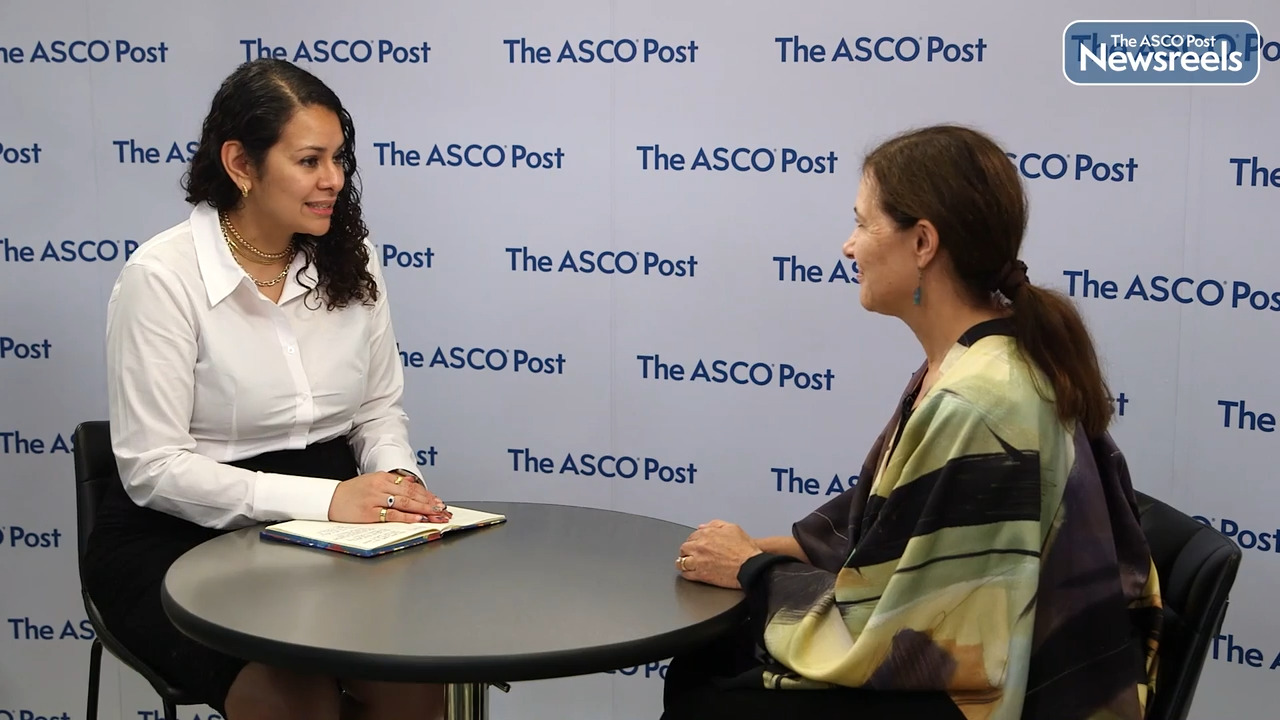Transcript
Disclaimer: This video transcript has not been proofread or edited and may contain errors.
Bobbie Rimel:
Good morning, Dr. Ray-Coquard. Thank you so much for joining me today, and congratulations on the COLIBRI study. Would you mind telling me a little bit about the design of the study, and how you chose to sequence the drugs this way?
Isabelle Ray-Coquard:
Thank you so much to learn about COLIBRI trial. We are very exciting by such trial. As you understand, it's not a trial dedicated to change routine practice, but to understand what's happened when we use immunotherapy in cervical cancer, and more particularly in locally advanced cervical cancer. The idea is really to explore the double checkpoint inhibition, nivolumab plus ipilimumab, just before to start standard radio chemotherapy.
Then to use a six months of maintenance therapy, to continue to include an immune response after radiotherapy. We would like, really, to understand two points. Our double checkpoint inhibition is able to change something in the micro environment of cervical cancer, and e-sequencing immunotherapy and radiotherapy can be better. That what we have seen, particularly with the results of the CALLA trial.
Bobbie Rimel:
Yeah. I think it's really striking, in the trial, that despite having a neoadjuvant immunotherapy section, that everyone was able to receive radiation, and there were no significant toxicities. Were you surprised by the safety profile of the trial?
Isabelle Ray-Coquard:
I would say no, because we try to work a lot before, and we just include one cycle of ipilimumab before radiotherapy, that it is, I'm thinking, totally easy. The safety profile right now, as you mentioned, is very good. Also, during the RTCT, and after, during the maintenance therapy, we see very few treatment related that adverse event. For sure, we need to wait for more long follow-up, to be sure about what we are seeing today, but the first signal is very good. The other point is that starting immunotherapy before radiotherapy, during these months, did not change anything. We see six patients, in partial response, after one month of immunotherapy. It's something really interesting for the patients.
Bobbie Rimel:
Very interesting for the patients. I noticed that there were about 25% of patients, who had a planned secondary biopsy, that were unable to undergo that biopsy. The reason cited was that they were concerned about having undergoing a painful procedure. Since this is such a critical translational endpoint, what are your thoughts for future studies about how to encourage, or help, patients participate in these critical biopsies?
Isabelle Ray-Coquard:
I'm not sure I will move in this setting in the future, for two reasons. You're right. Painful process never do to be proposed to the patient. What we have seen right now, in COLIBRI, is that on the 27 tumor biopsy we obtain, there is no tumor cell for 26. That mean that, probably, this biopsy, just after RTCT, is not so interesting. What we are doing, right now, we are correlating the systemic immune response and the results. If we are able to correlate immune systemic response, for the future, we will continue with blood sample, and we definitively avoid this biopsy just after RTCT, because of the painful process.
Bobbie Rimel:
Understood. Where do you think this data is going to fit, in the design of future, larger studies?
Isabelle Ray-Coquard:
I'm sure. I'm sure, because what we have report with the COLIBRI trial is that it is safe, acceptable for the patient, easy to run. I'm pretty sure that it is the good model for the researcher, the clinician, but also the pharma company, to move in such design, where we would like to explore, which could be the best combination of the best drug we have to explore in cervical cancer. I hope that this kind of trial, we will be very helpful to win time, and also to avoid the huge issue that we have when we include more than 400 patients in a Phase 3, with at the end we see negative results. It is really, the key message of this trial, we can do better, shorter, and easy for the patient.
Bobbie Rimel:
I think you're making some excellent points. Thank you so much for joining me today, and congratulations on your trial.
Isabelle Ray-Coquard:
Thank you very much.





